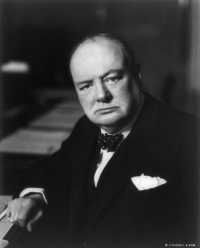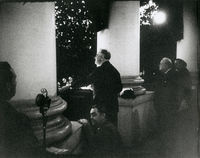
British prime minister Winston Churchill delivered a historic wartime address in the Senate Chamber before an informal meeting of Congress on December 26, 1941. In the days following the Japanese attack at Pearl Harbor on December 7, Congress had approved declarations of war and formally allied the U.S. with the British to defeat the Axis powers of Japan, Germany, and Italy. In Washington, D.C., to coordinate military strategy with President Franklin D. Roosevelt, Churchill accepted an invitation to speak before Congress.1
Traditionally, Congress holds joint meetings and sessions in the more spacious House of Representatives Chamber. On this occasion, perhaps because many senators and representatives were out of town for the holidays, Senate Majority Leader Alben Barkley invited the prime minister to speak in the more intimate Senate Chamber.2

Churchill’s schedule during his visit to Washington was tightly packed with business both official and social. He met with government officials, held a joint press conference with the president, joined Roosevelt in the ceremonial lighting of the National Christmas Tree, and on Christmas Day attended services at Foundry Methodist Church. Everywhere he went, the charismatic Churchill drew cheers and applause. “In less than a week’s time,” the Washington Post noted, “Americans have caught on to one of Winston Churchill’s major characteristics—his ability to thrill a crowd.” His most significant public appearance, however, came when he spoke to Congress in the Senate Chamber.3
_churchillticket_m.jpg)
On the chilly morning of December 26, Capitol Hill buzzed with anticipation. Crowds gathered, hoping to catch a glimpse of Churchill’s arrival at the Capitol. Shortly before noon, the House recessed and its members proceeded to the Senate Chamber. Senate doorkeepers seated House members at desks on the side of the Chamber reserved for the Republican senators while senators crowded into desks on the Democratic side. Supreme Court justices and members of President Roosevelt’s cabinet sat in the first row. Soon, all 96 desks were occupied, forcing doorkeepers to place extra chairs at the rear of the Chamber to accommodate the crowd. Even with limited public access to the event, the visitors’ galleries overflowed with members’ families and foreign guests.4
_churchillspeechsenatechamber_m.jpg)
A hush fell over the crowded Chamber as Churchill took his place at a lectern bristling with microphones. Three national radio stations broadcast his speech live, and two others delivered it overseas via shortwave radio. Powerful overhead lamps illuminated the otherwise dimly lit Senate Chamber. Newsreel cameras began to roll, recording every word for posterity.5
The prime minister began on a light-hearted note. “The fact … that here I am, an Englishman, welcomed in your midst, makes this experience one of the most moving and thrilling in my life, which is already long and has not been entirely uneventful.” The audience erupted in laughter, but soon his speech turned serious. The prime minister warned that “many disappointments and unpleasant surprises await us” and predicted that Allied forces would need more than a year to turn the tide of war. The United Kingdom had been the target of a nine-months-long German bombing campaign—known as the Blitz—and Churchill noted that the Axis powers “are enormous; they are bitter; they are ruthless.” These “wicked men” he called them, had brought evil forces into play. They must “know they will be called to terrible account.” “Now,” he stated solemnly, “we are the masters of our fate.”6
_churchill_closeup_horizontal_m.jpg)
Churchill’s audience included isolationists who had resisted U.S. involvement in the overseas conflict. This bipartisan group, which included Senator Burton Wheeler, a Montana Democrat and a prominent figure in the “America First” movement, had worked to pass a series of neutrality acts to limit the administration’s financial and materiel support for Allied forces. The Pearl Harbor attack had significantly weakened this movement’s popularity, however, and Churchill noted Americans’ resolve to defeat the Axis powers. “Here in Washington,” he observed, “I have found an Olympian fortitude … the proof of a sure and well-grounded confidence in the final outcome.”
His rousing speech prompted spontaneous cries of “Hear, Hear” and vigorous rounds of applause. At the conclusion of Churchill’s 30-minute address, Chief Justice of the United States Harlan F. Stone extended a “V” for victory sign. Churchill responded in kind. “The effect was instantaneous, electric,” observed one reporter. “The cheers swelled into a roar.”7
It was a speech “full of bubbling humor…, stern courage—and hard facts,” reported the New York Times, and seemed to have the intended effect of inspiring lawmakers to rally behind a unified war effort. Senator John Gurney of South Dakota offered his enthusiastic support for “complete cooperation” between the two countries, and Senator Joseph Guffey of Pennsylvania exclaimed that it was “one of the greatest speeches I have ever heard.” Even Wheeler conceded that the speech was “clever” and would appeal to the “average American.”8
After exiting the Senate Chamber, Churchill joined Vice President Henry Wallace and a select group of six House and Senate leaders for a private luncheon in the Capitol before returning to the White House. His visit to the Capitol, and the unusual occasion of a joint meeting held in the Senate Chamber, would not soon be forgotten. Churchill would return to the Capitol to address joint meetings two more times, in 1943 and 1952, an honor afforded to only one other foreign dignitary in the nation’s history.9
Notes
2. Robert C. Albright, “British Premier Will Address Senate Tomorrow,” Washington Post, December 25, 1941, 1; “Roosevelt and Churchill Attend Public Yule Church Services,” The Sun, December 26, 1941, 1; Libbey, Alben Barkley; John Fisher, “Give Us Victory! Roosevelt and Churchill Pray,” Chicago Daily Tribune, December 26, 1941, 3.
9. Gladstone Williams, “Georgian, Two Other Senators Greet Churchill,” Atlanta Constitution, December 27, 1941, 2; “Joint Meeting & Joint Session Addresses Before Congress by Foreign Leaders & Dignitaries,” History, Art & Archives, United States House of Representatives, accessed April 22, 2022, https://history.house.gov/Institution/Foreign-Leaders/Joint-Sessions/.